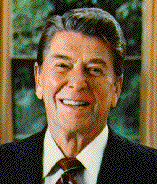

Ronald Reagan page

"[The Reagan Administration]
was a PR outfit that became president and took over the country.
And to the degree that the Constitution forced them to do things
like make a budget, run foreign policy and all that, they sort
of did it. But their first, last and overarching activity was
public relations."
Leslie Janka, a deputy White House
press secretary under Ronald Reagan
Books
"We have never interfered
in the internal government of a country and have no intention
of doing so, never have had any thought of that kind."
Ronald Reagan, 1982
"The whole thing was
PR. This was a PR outfit that became President [Reagan] and took
over the country. And to the degree then to which the Constitution
forced them to do things like make a budget, run foreign policy
and all that, they sort of did. But their first, last, and overarching
activity was public relations."
Leslie Janka, a deputy White
House press secretary under Reagan
"Unemployment insurance
is a pre-paid vacation for freeloaders."
California Governor Ronald Reagan,
in the Sacramento Bee, April 28, 1966
"It's silly talking about
how many years we will have to spend in the jungles of Vietnam
when we could pave the whole country and put parking stripes on
it and still be home by Christmas."
Ronald Reagan (candidate for Governor
of California), interviewed in the Fresno Bee, October
10, 1965
" By the later years of
the Reagan regime, a preferred nomenclature suited to U.S. interests
became standardized for the Third World. In the case of nations
to be rolled back (e.g., Nicaragua), governments were called terrorist
and the insurgents were labeled democratic. In the case of countries
to be supported against "communist" insurgencies (e.g.,
El Salvador and the Philippines), the governments were called
democratic and the insurgents were labeled terrorists. "
from the book Rollback by Thomas
Bodenheimer and Robert Gould
"This loathing for government,
this eagerness to prove that any program to aid the disadvantaged
is nothing but a boondoggle and a money gobbler, leads him to
contrive statistics and stories with unmatched vigor."
Mark Green, Reagan's Reign of
Error
"The pattern was set early
in his [Ronald Reagan] administration: leak a scare story about
foreign enemies, grab the headlines. If, much later, reporters
poke holes in the cover story, so what? The truth will receive
far less attention than the original lie, and by then another
round of falsehoods will be dominating the headlines."
Norman Solomon and Martin Lee
about Reagan-era propaganda strategies
Articles
"Every president
who followed [Ronald] Reagan would be squired by image consultants
and pollsters; the Washington press corps would not be informed
of the government's real activities but distracted and manipulated;
speeches would be filled with meaningless drivel; and the public
would come to regard politicians as no more worthy of trust than
used-car salesmen."
William Kleinknecht,
"The Man Who Sold The World"
"In the Reagan White House,
the engineering of consent was accomplished in part by manipulation
of the press. Michael Deaver, David Gergan and other media strategists
made it their goal every morning to control that day's story.
They would develop a "line of the day" and push it at
the press corps, usually scheduling a highly visual event that
would please the television networks. The effort was extremely
successful in setting the agenda for the media, which spent little
time analyzing the implications of Reagan's sweeping transformation
of federal policies."
William Kleinknecht,
"The Man Who Sold The World"
"[Ronald] Reagan ... was
most definitely a global empire builder, a servant of the corporatocracy.
At the time of his election, I found it fitting that he was a
Hollywood actor, a man who had followed orders passed down from
moguls, who knew how to take direction. That would be his signature.
He would cater to the men who shuttled back and forth from corporate
CEO offices to bank boards and into the halls of government. He
would serve the men who appeared to serve him but who in fact
ran the government - men like Vice President George H. W. Bush,
Secretary of State George Shultz, Secretary of Defense Caspar
Weinberger, Richard Cheney, Richard Helms, and Robert McNamara.
He would advocate what those men wanted: an America that controlled
the world and all its resources, a world that answered to the
commands of that America, a U.S. military that would enforce the
rules as they were written by America, and an international trade
and banking system that supported America as CEO of the global
empire."
John Perkins
 International War Crimes
International War Crimes
 Home Page
Home Page


